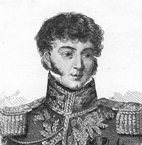General Jean Marie Pierre François Lepaige Dorsenne

Born: April 30, 1773
Place of Birth: Ardres, Pas-de-Calais, France
Died: July 24, 1812
Cause of Death: Wounds never fully healed
Place of Death: Paris, France
Arc de Triomphe: DORSENNE on the west pillar
Pronunciation:
The son of a colonel, Jean Marie Pierre François Lepaige Dorsenne began his military career when he volunteered in 1791, joining a battalion of Pas-de-Calais. The next year he was wounded in the fighting at Pas-de-Baisieux and later he was promoted to capitaine. Serving with the Army of the North, in May of 1793 Dorsenne was wounded again, this time by a shot to the right leg at the Battle of Tourcoing . At the end of the year he joined the 24th demi-brigade, and over the next few years he served with the Army of the Sambre and Meuse. In January of 1797 Dorsenne joined Bernadotte's division in the Army of Italy. Two months later he distinguished himself at the crossing of the Tagliamento and he was promoted to chef de bataillon on the battlefield by General Bonaparte. The following year Dorsenne joined the expedition to Egypt where he served in Desaix's division, fighting at the Battle of the Pyramids . In 1799 he was wounded by a shot to the right hand at Kéné, in 1800 General Kléber promoted him to chef de brigade of the 61st of the Line, and then in 1801 he was wounded in the left shoulder while fighting at Alexandria.
Returning to France after the French surrender in Egypt, Dorsenne joined the Consular Guard, instilling strict discipline into his unit. In March of 1805 he was named a major of the Imperial Guard and in October he was made the colonel-major of the brigade of foot grenadiers of the Imperial Guard. He was very proud of his Guard soldiers and was so sure of their discipline that he once remarked, "If I had a wagon load of gold, I would put it in the mess-room of my grenadiers, it would be safer there than under lock and key."1 After serving at the Battle of Austerlitz, Dorsenne was rewarded with a promotion to général de brigade in the regular army and to colonel in the Guard. He went on to distinguish himself at the Battle of Eylau in 1807 and in 1808 he became a Count of the Empire. By now Dorsenne had gained a reputation of considerable sang-froid while under fire, completely turning his back on the enemy fire and then giving orders to his men without one glance as to what was going on behind him.2
Temporarily sent to Spain with a detachment of infantry of the Guard, Dorsenne returned to Paris in early 1809 and then took command of the Grenadiers and Chasseurs à Pied of the Imperial Guard in the Danube Campaign. After serving at Ratisbon unscathed, he was not so lucky at the Battle of Aspern-Essling . As his men were cut down and the dirt that was kicked up by the artillery rained down upon him, Dorsenne held his ground and told his men, "Your general is not hurt. You may depend on him, he will know how to die at his post."3 Later during the battle he was wounded, receiving a wound to the head that would plague him for the rest of his life. On July 1st Dorsenne took command of the 2nd Division of Infantry of the Old Guard and he led them at the Battle of Wagram less than a week later.
In 1810 Dorsenne was sent to Spain to take command of the Imperial Guard in Spain. His wife accompanied him to Spain, but she refused to travel at a walking pace, forcing her escort of soldiers to run alongside the carriage to keep up with her. Many soldiers of her escort were hospitalized due to the strain of running such distances.4 In June of 1810 Dorsenne became governor of the province of Burgos and then in December he became governor of Old Castile. The next summer he took command of the Army of the North in Spain, replacing Marshal Bessières. That summer Dorsenne was made a Grand Officer of the Legion of Honor and he won at Saint-Martin de Torrès, and then he reunited his force with Marshal Marmont's. In May of 1812 Dorsenne quit his command and returned to Paris for a risky procedure of trepanning to help relieve issues stemming from his wound received at Aspern-Essling in 1809. Unfortunately, the surgery did not go well and he died from complications.
Notes
- Joel Tyler Headley, The Imperial Guard of Napoleon: From Marengo to Waterloo, (New York: Charles Scribner's Sons: 1888), 133-134.
- John R. Elting, Swords Around a Throne: Napoleon's Grande Armée, (USA: Da Capo Press, 1997), 208.
- Philip Haythornthwaite, Napoleon's Commanders (1) c1792-1809, (Oxford: Osprey Publishing, 2001), 25.
- Elting, Swords Around a Throne, 609.
Bibliography
- Divry, Arnauld. Les Noms Gravés sur l'Arc de Triomphe. Paris: L'Harmattan, 2017.
- Six, Georges. Dictionnaire Biographique des Généraux & Amiraux Français de la Révolution et de l'Empire (1792-1814). 2 vols. Paris: Gaston Saffroy, 2003.
Updated March 2023
© Nathan D. Jensen